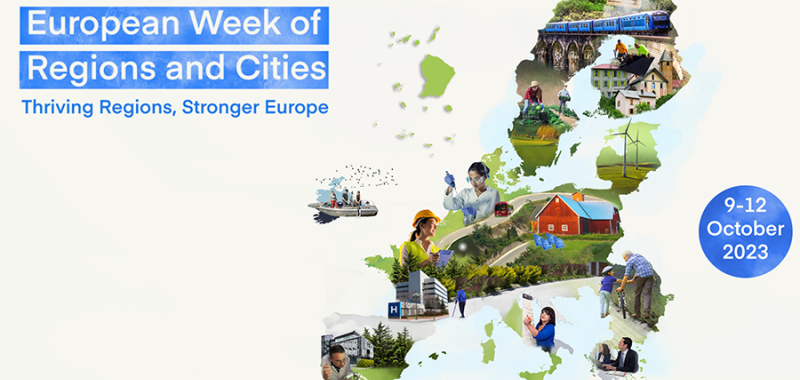Thriving Regions, Stronger Europe
- European Committee of the Regions | regional and local authorities
- Monday 9 October 2023, 09:00 - Thursday 12 October 2023, 16:00 (CEST)
Practical information
- When
- Monday 9 October 2023, 09:00 - Thursday 12 October 2023, 16:00 (CEST)
- Languages
- English
- Website
- https://europa.eu/regions-and-cities/
Description
What actually happens?
The European Week of Regions and Cities (#EURegionsWeek) is the biggest annual event dedicated to regional policy. During this annual four-day event, regions, and cities showcase their capacity to create growth and jobs, implement European Union cohesion policy, and prove the importance of the local and regional level for good European governance.
Since its first edition in 2003, the event has grown to become a unique communication and networking platform, bringing together regions and cities from all over Europe, including their political representatives, officials, experts and academics. The EURegionsWeek has done much to promote how regions and cities use EU funds to improve citizens' daily lives.
In October, more than 10 000 participants – including more than 1 000 speakers from all over Europe and beyond – will take part in an extensive programme of conferences, exhibitions and networking events on regional and local development. The programme is adapted every year to the specific context of the EU agenda. Participation in the event is free of charge.
Why a week for regions and cities?
Regions and cities are involved in the making of most EU policies. Subnational public authorities in the EU are responsible for one-third of public expenditure (EUR 2 100 billion each year) and two-thirds of public investment (about EUR 200 billion), the latter often to be spent in accordance with EU legal provisions.
How did it start?
Back in 2003, the European Committee of the Regions, the EU's assembly of regional and local representatives, invited Brussels-based local and regional representations to the European Union to open their doors to visitors at the same time as part of a joint "Open Days" concept. Over the years, the initiative has developed into a key annual event involving the European Commission and other stakeholders. In 2016, it was renamed the "European Week of Regions and Cities", dropping the "Open Days" heading. This was to avoid confusion with the Brussels-based "Open Doors / Open Day" events held every May by all EU institutions around Europe Day, as well as with similar events held by the Commission's representations in the Member States on the same occasion.
Who are the organisers?
The European Week of Regions and Cities is jointly organised by the European Committee of the Regions (CoR) and the European Commission's Directorate-General for Regional and Urban Policy (DG REGIO). A call for partners is launched early in the year, usually in January. Following the call, partners from all over Europe are selected: regions and cities, mainly grouped into consortia with shared issues (regional partnerships), companies, financial institutions, international associations, or academic organisations. Partners are required to hold seminars on matters of common interest, often related to implementing European Structural and Investment Funds and other EU programmes.
How is the programme arranged?
The programme is designed around a key slogan and a number of sub-topics. The sessions are organised by three categories of partners: 1) regions or cities; 2) EU institutional partners; and 3) companies, financial institutions and local and European associations.
Who attends the European Week of Regions and Cities?
The audience is specifically interested in regional and urban policy, so mainly comprises officials at local, regional, national and EU level. The typical participant is from a regional or local administration.
What is the impact of the European Week of Regions and Cities?
The impact of the event has been systematically evaluated from the very beginning. Participants have highlighted in particular the usefulness for their professional management of EU funds of information gained from the EU institutions and the networking with colleagues from other countries. The importance of the event is also proven by its significant media impact. For years now, up to 300 print, radio, TV and online media journalists from all over Europe have come to Brussels to cover it.
How to apply as a participant?

